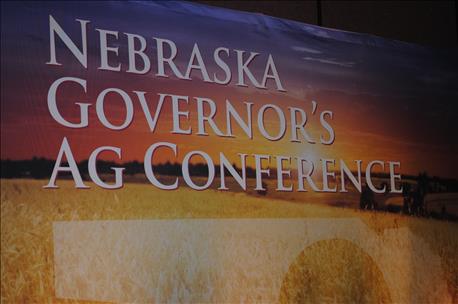
At the Governor’s Ag Conference in Kearney yesterday, I really enjoyed Charlie Arnot’s presentation about providing transparency in food production. Charlie is the chief executive officer with the Center for Food Integrity, and his knowledge and understanding of what matters to consumers truly sheds light on how we can talk about farming.
According to extended and extensive consumer studies, farmers have been getting at least part of our food discussions wrong. We’ve been truthful with consumers about our practices and the science behind everything we do, that’s for sure. But that isn’t where we’ve been getting it wrong.

AG CONFERENCE: Food transparency and integrity were part of th discussions at this week's Governor's Ag Conference in Kearney.
We have been providing the factual accounts that back up practices, intellectually letting consumers know that what we are doing is best for the environment, for the animals and natural resources we steward because of the science behind it. However, as it turns out, consumers don’t care if science backs up our practices. They want our values to be the driver behind what we do.
Related: When in doubt, test it out
To me, it is kind of like the elephant in the room. Why didn’t we think of that sooner? Why didn’t we realize that? It is obvious, but we’ve been missing the point. If you are a mother or father living in urban New York or Florida or California, you may not care if farmers’ practices of using GMO seed, no-till practices or animal husbandry practices are backed by science. Before you feed your children food from conventional farms and farmers, you want to know that the farmers share your values in food production. You want to know that farmers are using GMO seed not to gain more profit or make their lives easier, but actually to use fewer pesticides and be more environmentally sound. We need to tell consumers about new technology and new practices being employed because we share their values for the land, resources and food.
Arnot said that shared values scored highest among consumer groups and focus groups when asked about food and farm transparency. That’s why once again it is crucial for farmers to make sure their practices are what they say they are. That’s why it is important for us to be environmentally sound and responsible. And that’s the reason why farmers are so well-equipped to meet with consumers over shared values because the same values are typically important to farmers. We just need to let consumers know that.
According to Arnot, we need to tell the story of our families and our farms from the values perspective that is most important to consumers. The science and facts behind our values are still key, but consumers want to meet us on the platform of what motivates farmers on the land. That is a conversation we can surely have, and most consumers will find that farmers share their values quite deeply.
You can learn more about this year’s Governor’s Ag Conference and Arnot’s presentation by reading upcoming articles on Nebraska Farmer online and on our Facebook page. Follow me on Twitter @HuskerHomePlace #NebFarmNow.
About the Author(s)
You May Also Like






